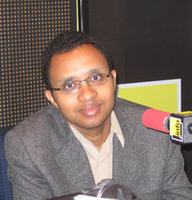 The Emergence of "French Blacks"
The Emergence of "French Blacks"
Public Lecture by Pap Ndiaye
Ecole des Hautes Etudes en Sciences Sociales, Paris
In English
Friday, February 6, 2009 | 2:30 pm | Diffenbaugh 009 | Florida State University
Arranged by the Winthrop-King Institute for Contemporary French and Francophone Studies
|
Racial and ethnic categories were until recently officially taboo in France, though in camouflaged forms they circulated widely in media and political discourse on the "integration" of immigrant minorities. In recent years, men and women of color have begun mobilizing as "Noirs" (Blacks) in ways that are hitherto unprecedented in France. Pap Ndiaye argues that the official invisibility of French Blacks, rather than being the logical and peaceful consequence of their integration into French society, can be analyzed as a consequence of discriminatory processes. On an academic level, the situation is rather similar. In France, there are more books and articles published on African-Americans than on African-French or Carribean-French peoples. Indeed, African-American history is a well-established field in France. By contrast, studies on African immigrants, African students, Guadeloupean civil servants, etc, are scarce, and there is practically nothing on "French Blacks", as if this figuration had no legitimacy or meaning to describe past and contemporary social situations. The situation is slowly changing, as more and more French acknowledge the existence of a sizable Black minority with specific problems and needs. Professor Ndiaye studies the reasons why this history has been so neglected, emphasizing ideological, political and academic reasons. He also discusses the legitimacy of the notion of "French Blacks" and analyzes the recent rise of Black organizations in France. Pap Ndiaye has researched and published widely on Blacks in both the US and France. His book on La condition noire: essai sur une minorité française (Paris: Calmann-Lévy, 2007) has attracted wide attention in the current debate over diversity and representation in France. He is an Associate Professor at the Ecole des hautes etudes en sciences sociales in Paris. Professor Ndiaye's visit is arranged in association with the Cultural Services of the French Embassy in the United States. |
||
|
For more information contact: Department of Modern Languages and Linguistics Florida State University Tallahassee, Florida 32306-1540 Telephone 850.644.7636 Fax 850.644.9917 E-mail icffs@mailer.fsu.edu Website www.winthropking.fsu.edu |

